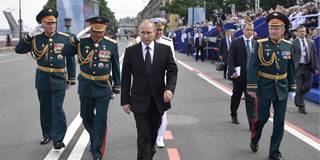A quarter-century after the end of the Cold War, the world unexpectedly finds itself in a second one. This state of affairs was anything but inevitable, and it is in neither side's interest to escalate tensions further.
NEW YORK – The Cold War lasted four decades, in many ways both beginning and ending in Berlin. The good news is that it stayed cold – largely because nuclear weapons introduced a discipline missing from previous great-power rivalries – and that the United States, together with its European and Asian allies, emerged victorious, owing to sustained political, economic, and military effort that a top-heavy Soviet Union ultimately could not match.
A quarter-century after the end of the Cold War, we unexpectedly find ourselves in a second one. It is both different and familiar. Russia is no longer a superpower, but rather a country of some 145 million people with an economy dependent on the price of oil and gas and no political ideology to offer the world. Even so, it remains one of two major nuclear-weapons states, has a permanent seat on the UN Security Council, and is willing to use its military, energy, and cyber capabilities to support friends and weaken neighbors and adversaries.
This state of affairs was anything but inevitable. The end of the Cold War was expected to usher in a new era of friendly Russian ties with the United States and Europe. It was widely thought that post-communist Russia would focus on economic and political development. And relations got off to a good start when Russia, rather than standing by its long-time client Iraq, cooperated with the US in reversing Saddam Hussein’s invasion of Kuwait.

NEW YORK – The Cold War lasted four decades, in many ways both beginning and ending in Berlin. The good news is that it stayed cold – largely because nuclear weapons introduced a discipline missing from previous great-power rivalries – and that the United States, together with its European and Asian allies, emerged victorious, owing to sustained political, economic, and military effort that a top-heavy Soviet Union ultimately could not match.
A quarter-century after the end of the Cold War, we unexpectedly find ourselves in a second one. It is both different and familiar. Russia is no longer a superpower, but rather a country of some 145 million people with an economy dependent on the price of oil and gas and no political ideology to offer the world. Even so, it remains one of two major nuclear-weapons states, has a permanent seat on the UN Security Council, and is willing to use its military, energy, and cyber capabilities to support friends and weaken neighbors and adversaries.
This state of affairs was anything but inevitable. The end of the Cold War was expected to usher in a new era of friendly Russian ties with the United States and Europe. It was widely thought that post-communist Russia would focus on economic and political development. And relations got off to a good start when Russia, rather than standing by its long-time client Iraq, cooperated with the US in reversing Saddam Hussein’s invasion of Kuwait.